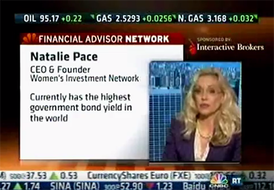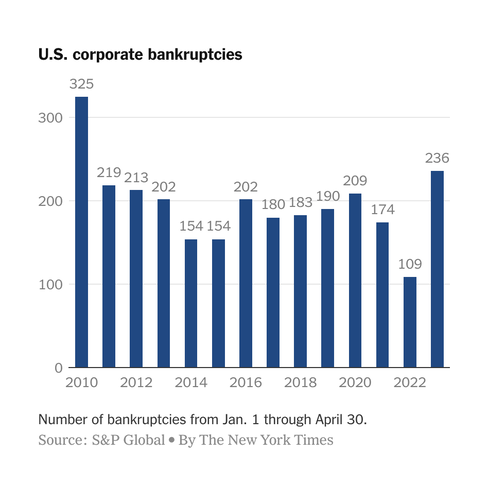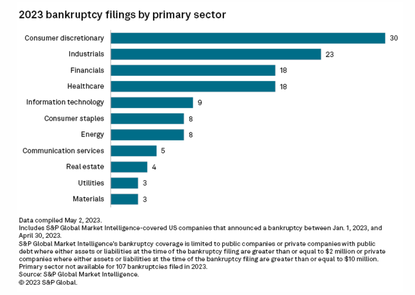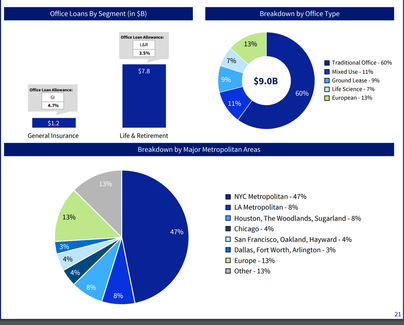|
Bankruptcies Soar. Insurance Company Risks. Buffett and Branson Losses. Insurance companies are taking on high risk, according to the Federal Reserve’s Financial Stability Report, which was released on May 8, 2023. Warren Buffett (Berkshire Hathaway) lost almost $23 billion last year. Virgin Orbit filed for bankruptcy on April 4 (Richard Branson’s company). Discover how all of this ties together. It’s hard to invest successfully when everything is going down in value. Warren Buffett lost almost $23 billion last year. Virgin Orbit filed for bankruptcy last month. According to S&P Global, U.S. corporate bankruptcy filings are the highest this year that they’ve been since 2010. I mention all of this for a multitude of reasons. It’s important for us personally to protect our wealth, in a world where banks are failing, stocks are falling, bonds (traditionally considered safe) are illiquid and losing value, with the added risk that our insurance and annuity policies are not as safe as many of the policyholders are banking on. All of this is interrelated because the weakness in banks is as a result of lending to businesses that are up against the ropes, and holding long-term bonds that are losing value. Which Businesses are the Most Impacted by the Bankruptcies? As you can see in the chart above, consumer discretionary has seen the most companies go belly-up so far in 2023, with Bed, Bath and Beyond (a former meme stock darling) being one of the more high-profile. Industrials (like Virgin Orbit), financials (SVB, Signature, First Republic, Credit Suisse) and health care have significant insolvencies, too. So far, real estate looks pretty safe. However, empty office buildings, particularly in metro areas like San Francisco and New York City, are a looming threat. As I mentioned in my Real Estate blog a few weeks ago, it’s no accident that Silicon Valley Bank and First Republic (both San Francisco area based) and Signature Bank (based out of Manhattan) were the first to be seized by the FDIC. This is a problem for life insurers (who also sell annuities) because many are heavily invested in real estate mortgage loans, including partially empty office buildings. The Risks to Insurance Companies According to the Federal Reserve’s Financial Stability Report, “Life insurers continue to allocate a high percentage of assets to instruments with higher credit or liquidity risk, such as high-yield, corporate bonds, privately placed corporate bonds, and alternative instruments. These assets can suffer sudden increases in default risk, putting pressure on insurer capital positions.“ If Warren Buffett can lose $23 billion in a year, how creditworthy is the life insurance company that is in charge of our annuity and or life insurance? How much did they lose last year or are at risk of losing this year and going forward? Are insurance companies, including Berkshire Hathaway, at risk of failing in 2023, like some banks have? What happens when they do? Is there a federal agency that protects insurers like the FDIC protects depositors? How Healthy are Insurance Companies? The earnings in most insurance companies are starting to show weakness. Some companies like Berkshire Hathaway, Prudential Financial and Lincoln National lost a lot of money in 2022. Others, including AIG, Lincoln National and Corebridge have seen their income and earnings plunge in the most recent quarter. You have to wade through a lot of cheerleading in the AIG 1st quarter 2023 results before you get to page 3, where they admit that their pre-tax loss was $231 million compared to pretax income of $5.7 billion a year ago. AIG is the parent company of various life insurance companies. It’s a good idea to check just which company, and their credit rating and earnings outlook, owns our future. Exposure to Long-Term Bonds, Commercial Real Estate & Mortgage-Backed Securities The losses at AIG came from investments, rather than sales of their insurance retirement and annuity products. According to the 1Q earnings report, AIG’s total invested assets amount to about $285.2 billion. (The company’s market value is only $38 billion.) Of that total, commercial mortgage loans total about $34 billion, with $8.6 billion invested in office loans. Almost half of AIG’s office exposure is in NYC, which is one of the areas where companies are reducing their office space and/or attempting to sublease unused floors. It’s common for insurance companies to have large holdings of corporate bonds, mortgage backed securities, real estate, and other alternative investments. This worked in a low-interest rate, low-default environment, but can become very problematic in a Work-From-Home, inflationary, high vacancy, expensive borrowing, potential recession year. Again, in the Financial Stability Report, the writers stress, “Life insurers continue to have elevated liquidity risks, as the share of risky and illiquid assets remained high.” Which companies are the Most at Risk? Lincoln National, AIG and Corbridge are all at the lowest rung of investment grade, just above junk-bond status. The other insurers on our stock report card are rated A or A-. At minimum, it’s important to know the credit rating of your insurance company. However, it’s also prudent to be aware that First Republic Bank was rated A- before it failed. It went directly to junk without warning. If you’d like to receive my Insurance Company Stock report Card, just email [email protected]. Not FDIC-Insured Life insurance products are never FDIC-insured. They are backed solely by the company. AIG and other insurance companies had to be bailed out in 2008. Will they be bailed out in the next crisis? Will insurers be short-changed? Is this a risk you wish to take? Now would be a very good time to rethink our exposure to insurance, annuities and other products offered by life insurance companies – before they face trouble and start making headlines. The exposure to default is not the only risk one takes on with insurance companies. There might be hidden fees. There can be fine print where our benefits might be reduced, while our premiums increase in certain circumstances. (One of my friends had a million dollar life insurance policy that over time was reduced to just $250,000. They were paying $20,000/year in premiums for more than 15 years – money that could have been compounding, if invested, instead of siphoning off their wealth.) The older you get, the higher the premiums soar, and the greater risk of a reduction in benefits. Of course, if the unfortunate happens early on in the policy, it is a windfall. Annuity products are one of the few investments where your money goes down by 9% or more the minute you buy the product. They call it a surrender fee. (Gold and silver coins, and new cars fall into the money pit of losing a lot at the purchase point, too.) We might think, “Well, if I just hold it for a decade, then I’ll have made XYZ annualized return.” However, are we factoring in that the company itself might get into trouble before then, or that life might hand us an opportunity or a challenge where the money might be put to better use or needed elsewhere? FINRA.org does a very good job of talking about the pluses and drawbacks of annuities. Click to access their information and education. Also, read the fine print and factor in the risk of turning over your future without having a safety net, like the FDIC. Safety nets are a good idea in the Debt World that we find ourselves in. Warren Buffett’s Attitude about the Losses A couple of times in the Berkshire Hathaway 1Q 2023 earnings report the executives write that they “believe that investment gains and losses on investments in equity securities …are generally meaningless.” It appears that at least part of the losses in 2022 were from put options, which have expired. So, that chapter might be behind them. In the most recent quarter, earnings are up 21% year over year. Berkshire Hathaway is a very diversified company, with ownership in Geico car insurance, railroads, Heinz, energy, Apple, utility projects, and other equity investments. Their stock portfolio includes a lot of banks. So continued weakness in banks will definitely impact Berkshire Hathaway. However, the company has a $125 billion cash cushion, so they can buy time through troubled periods. Additionally, Berkshire’s diversification model and emphasis on safety above yield is a time-proven, recession-proof strategy. I wouldn’t put all of my eggs in the Berkshire basket, particularly at this moment when the company is trading near its all-time high. However, even with the risk and weakness of most insurance companies, one could make a case of having a slice of Berkshire – for the investor who is okay with owning a company that invests in fossil fuels and plastic chemicals. Bankruptcies Are at a 13-Year High Again, with:
Now is the time when we really have to batten down the hatches on our financial house, to make sure that our wealth is protected from the economic storms on the horizon. A forensic assessment must include our insurance products, in addition to how we’re going to protect the wealth stored in our retirement plan. You can read about our time-proven, recession-proof budgeting and investing strategies in my books. You can learn and implement them by attending our June 10-12, 2023 online Financial Empowerment Retreat. Or, you can engage me personally for an unbiased 2nd opinion through my private coaching practice. Email [email protected] to learn more. Email [email protected] or call 310-430-2397 if you are interested in learning time-proven investing, budgeting, debt reduction, college prep, ESG and home buying solutions that will transform your life and heal our planet at our next Financial Freedom Retreat. We spend one full day on what's safe, helping you to protect your wealth and reduce money stress.  Join us for our Online Financial Freedom Retreat. June 10-12, 2023. Email [email protected] to learn more. Register with friends and family to receive the best price. Click for testimonials, pricing, hours & details.  Join us for our Restormel Royal Immersive Adventure Retreat. March 8-15, 2024. Email [email protected] to learn more. Register with friends and family to receive the best price. Click for testimonials, pricing, hours & details. Early Bird pricing ends May 30, 2023. There is very limited availability.  Natalie Wynne Pace is an Advocate for Sustainability, Financial Literacy & Women's Empowerment. Natalie is the bestselling author of The Power of 8 Billion: It's Up to Us and is the co-creator of the Earth Gratitude Project. She has been ranked as a No. 1 stock picker, above over 835 A-list pundits, by an independent tracking agency (TipsTraders). Her book The ABCs of Money remained at or near the #1 Investing Basics e-book on Amazon for over 3 years (in its vertical), with over 120,000 downloads and a mean 5-star ranking. The 5th edition of The ABCs of Money was released on September 17, 2021. Natalie Pace's easy as a pie chart nest egg strategies earned gains in the last two recessions and have outperformed the bull markets in between. That is why her Investor Educational Retreats, books and private coaching are enthusiastically recommended by Nobel Prize winning economist Gary S. Becker, TD AMERITRADE chairman Joe Moglia, Kay Koplovitz and many Main Street investors who have transformed their lives using her Thrive Budget and investing strategies. Click to view a video testimonial from Nilo Bolden. Check out Natalie Pace's Apple Podcast. Watch videoconferences and webinars on Youtube. Other Blogs of Interest Schwab Loses $41 Billion in Cash Deposits. The Debt Ceiling Crisis. What's at Stake? Fiat. Crypto. Gold. BRICS. Real Estate. Alternative Investments. BRICS Currency. Will the Dollar Become Extinct? Empty Office Buildings & Malls. Frozen Housing Market. The Online Global Earth Gratitude Celebration 7 Green Life Hacks The Debt Ceiling. Will the U.S. Stop Paying Bills in June? Fossil Fuels Touch Every Part of Our Lives Are There Any Safe, Green Banks? 8 Fires the Federal Reserve Board Needs to Put Out. 7 Ways to Stash Your Cash Now. Lessons from the Silicon Valley Bank Failure. The 2 Best Solar Stocks Which Countries Offer the Highest Yield for the Lowest Risk? Rebalance By the End of March Solar, EVs, Housing, HSAs -- the Highest-Yield in 2023? Are You Anxious or Depressed over Money? Why We Are Underweighting Banks and the Financial Industry. You Stream all the Channels. Should You Invest, Too? NASDAQ is Still Down -26%. Are Meta & Snap a Buy? 2023 Bond Strategy Emotions are Not Your Friend in Investing Investor IQ Test Investor IQ Test Answers Bonds Lost -26%, Silver Held Strong. 2023 Crystal Ball for Stocks, Bonds, Real Estate, Cannabis, Gold, Silver. Tilray: The Constellation Brands of Cannabis New Year, New Healthier You Tesla's $644 Billion Fall From Mars Silver's Quiet Rally. Free Holiday Gift. Stocking Stuffers Under $10. Cash Burn & Inflation Toasted the Plant-Based Protein Companies Save Thousands Annually With Smarter Energy Choices Is Your FDIC-Insured Cash Really Safe? Giving Tuesday Tips to Make Your Charitable Contribution a Triple Win. Is Your Pension Plan Stealing From You? The FTX Crypto Fall of a Billionaire (SBF). Crypto, Gold, Silver: Not So Safe Havens. Will Ted Lasso Save Christmas? 3Q will be Released This Thursday. Apple and the R Word. Yield is Back. But It's Tricky. The Real Reason Why OPEC Cut Oil Production. The Inflation Buster Budgeting and Investing Plan. No. Elon Musk Doesn't Live in a Boxabl. IRAs Offer More Freedom and Protection Than 401ks. Will There Be a Santa Rally 2022? What's Safe in a Debt World? Not Bonds. Will Your Favorite Chinese Company be Delisted? 75% of New Homeowners Have Buyer's Remorse Clean Energy Gets a Green Light from Congress. Fix Money Issues. Improve Your Relationships. 24% of House Sales Cancelled in the 2nd Quarter. 3 Things to Do Before July 28th. Recession Risks Rise + a Fairly Safe High-Yield Bond DAQO Doubles. Solar Shines. Which Company is Next in Line? Tesla Sales Disappoint. Asian EV Competition Heats Up. 10 Wealth Strategies of the Rich Copper Prices Plunge Colombia and Indonesia: Should You Invest? 10 Misleading Broker/Salesman Pitches. Why are Banks and Dividend Stocks Losing Money? ESG Investing: Missing the E. Bitcoin Crashes. Crypto, Gold and Stocks All Crash. The U.S. House Decriminalizes Cannabis Again. The Risk of Recession in 6 Charts. High Gas Prices How Will Russian Boycotts Effect U.S. Multinational Companies? Oil and Gas Trends During Wartime Russia Invades Ukraine. How Have Stocks Responded in Past Wars? 2022 Crystal Ball in Stocks, Real Estate, Crypto, Cannabis, Gold, Silver & More. Interview with the Chief Investment Strategist of Charles Schwab & Co., Inc. Stocks Enter a Correction What's Safe in a Debt World? Money Market Funds, FDIC, SIPC: Are Any of Them Safe? My 24-Year-Old is Itching to Buy a Condo. Should I Help Him? The 12-Step Guide to Successful Investing. Gardeners Creating Sanctuary & Solutions in Food Deserts. The Bank Bail-in Plan on Your Dime. Rebalancing Your Nest Egg IQ Test. Answers to the Rebalancing Your Nest Egg IQ Test. Important Disclaimers Please note: Natalie Pace does not act or operate like a broker. She reports on financial news, and is one of the most trusted sources of financial literacy, education and forensic analysis in the world. Natalie Pace educates and informs individual investors to give investors a competitive edge in their personal decision-making. Any publicly traded companies or funds mentioned by Natalie Pace are not intended to be buy or sell recommendations. ALWAYS do your research and consult an experienced, reputable financial professional before buying or selling any security, and consider your long-term goals and strategies. Investors should NOT be all in on any asset class or individual stocks. Your retirement plan should reflect a diversified strategy, which has been designed with the assistance of a financial professional who is familiar with your goals, risk tolerance, tax needs and more. The "trading" portion of your portfolio should be a very small part of your investment strategy, and the amount of money you invest into individual companies should never be greater than your experience, wisdom, knowledge and patience. Information has been obtained from sources believed to be reliable. However, NataliePace.com does not warrant its completeness or accuracy. Opinions constitute our judgment as of the date of this publication and are subject to change without notice. This material is not intended as an offer or solicitation for the purchase or sale of any financial instrument. Securities, financial instruments or strategies mentioned herein may not be suitable for all investors. Comments are closed.
|
AuthorNatalie Pace is the co-creator of the Earth Gratitude Project and the author of The Power of 8 Billion: It's Up to Us, The ABCs of Money, The ABCs of Money for College, The Gratitude Game and Put Your Money Where Your Heart Is. She is a repeat guest & speaker on national news shows and stages. She has been ranked the No. 1 stock picker, above over 830 A-list pundits, by an independent tracking agency, and has been saving homes and nest eggs since 1999. Archives
July 2024
Categories |










 RSS Feed
RSS Feed